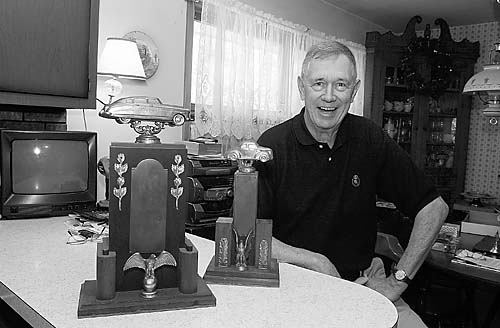“The Dirt Was Flying!”
Racing Pioneer Dave Kurtz
By Tom Adamich

The automobile has become a cultural symbol of freedom, mobility, and entertainment throughout the nation. This is especially true in the Mountain State, where automotive awareness — and stock car racing, in particular — is a way of life for many people. Not surprisingly, in the year 2000, West Virginia became the first state in the union to offer drivers an official NASCAR license plate.
Stock car racing in West Virginia began on dirt tracks, also known as short tracks, in towns such as Kerens, Vienna, Shinnston, Dunbar, and Mineral Wells. Beginning in the late 1940's, fans across the state packed the stands, climbed trees, and perched on hillsides every Saturday evening to watch as young individuals with a lot of heart, but not much money, came to pit themselves, their skill, and their vehicles against one another.
Drivers often raced their own daily-use vehicles, as well as surplus or junk cars modified for racing with whatever was available. Many drivers, for example, used chicken wire found at home as their roll cages. Most raced modified American-made cars, such as Ford, Chevrolet, Pontiac, Oldsmobile, Plymouth, Dodge, or Hudson.
Dave Kurtz of Weston is, in many ways, the embodiment of the pioneer era of West Virginia racing — quick-thinking, intelligent, resourceful, and vital. When visiting Dave and his wife Mimi at their home, I was immediately struck by Dave’s knowledge of numerous topics and his ability to quickly “shift gears.” Though I had arrived to talk about dirt-track racing, Dave immediately took me down the road to a local coin and gun shop, where we talked with a man about — not cars — but coins!
When the conversation eventually returned to the early days of West Virginia dirt-track racing, Dave’s descriptions were rich with historical content, filled with enthusiasm, and sprinkled with a few surprises. As the discussion progressed, I began to understand the greater impact of racing on Dave and Mimi’s life as a married couple, and how they viewed their experiences together as a reflection of what Dave calls the “West Virginia spirit.”
You can read the rest of this article in the Summer 2003 issue of Goldenseal, available in bookstores, libraries or direct from Goldenseal.